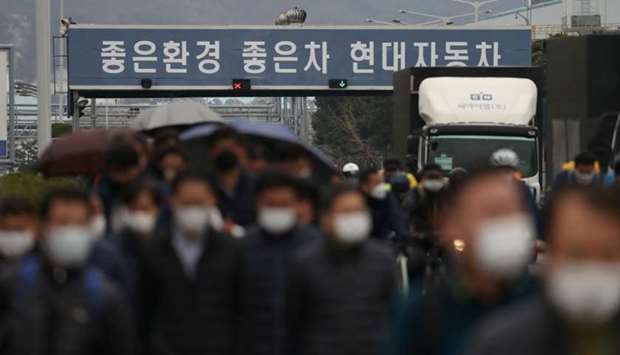* China's PMI suffers sharpest contraction on record
* Japan, South Korea factory activities also slump* Weak outcome puts pressure on policymakers for global response
Asia's factories took a beating in February from the coronavirus outbreak with activity in China shrinking at a record pace, surveys showed on Monday, raising the prospect of a co-ordinated policy response by central banks to prevent a global recession.
China's factory activity suffered the sharpest contraction on record in February, the Caixin/Markit Manufacturing Purchasing Managers' Index (PMI) showed, underlining the crippling effects of tough travel curbs and public health measures taken to contain the outbreak.
That followed the Chinese government's similarly dire PMI release on the weekend, which also showed a record pace of decline.
The slump in the world's second-largest economy dealt a severe blow to factories across Asia, including those in Japan, South Korea and Taiwan, offering the clearest evidence yet of the epidemic's damaging effects on global growth and businesses.
Fears the virus would wreak havoc on the global economy sent financial markets into a tailspin last week and raised expectations of co-ordinated monetary policy action by central banks to mitigate the fallout. Trillions of dollars were wiped off equity markets, with world shares posting their biggest weekly decline since the depths of the 2008 financial crisis.
"The slump in manufacturing activity looks to have had a significant impact on trade," Capital Economics wrote in a research note on the Caixin PMI.
"The PMIs also point to a major hit to employment, the effects of which will take longer to reverse. And with the jump in virus cases overseas, there is a growing risk of a protracted downturn in foreign demand."
Investors now await PMI readings out of major euro zone economies due later in the day, which are also expected to point to declining activity.
Japan's PMI showed its factory activity was hit by the sharpest contraction in nearly four years in February, reinforcing expectations the economy may have slipped into recession.
Separate data showed Japanese firms cut spending on plant and equipment in the quarter to December, casting doubt on the Bank of Japan's view that robust domestic demand will make up for some of the weakness in exports.
"Near-term prospects for Japan's industrial sector appear very bleak," said Joe Hayes, economist at IHS Markit, which compiles the survey.
South Korea's factory activity also shrank faster in February, as export orders contracted at the quickest pace in over six years in a shattering blow to production.
Activity in Vietnam and Taiwan, two key economies in the global technology supply chain, slipped into contraction from growth the month earlier.
Among Asian economies less reliant on global trade, growth in India's factory sector eased slightly from a near eight-year high in January while Indonesia's factory sector returned to growth.
The dismal readings have bolstered speculation global policymakers will launch a co-ordinated response to contain damage to the world economy. Those expectations helped stocks recoup some of their heavy losses on Monday.
BOJ Governor Haruhiko Kuroda on Monday joined U.S. counterpart Jerome Powell in pledging to take necessary steps to stabilise markets jolted by the virus.
In Australia, financial regulators held an emergency meeting to discuss the economic impact of the outbreak, two sources told Reuters, as markets moved to price in a central bank rate cut as early as this week.
China, for its part, has injected large amounts of liquidity to shore up market confidence.
The country's central bank - the People's Bank of China (PBOC) - has also told banks to help firms struggling with repayments by extending loans and not penalise them if they are late with payments.
"A rate cut only helps a little bit, by easing debt service costs. But it does little if anything to solve the bigger problems of cash flow interruption," said Rob Carnell, Asia- Pacific chief economist at ING in Singapore.
"This is where the BoJ's special loans...and the PBOC's suggested easing of banks' response to late or delinquent loans is closer to what is needed."
As well as capping long-term borrowing costs at around zero, the BOJ has several loan programmes in place to incentivise commercial banks to boost lending.

